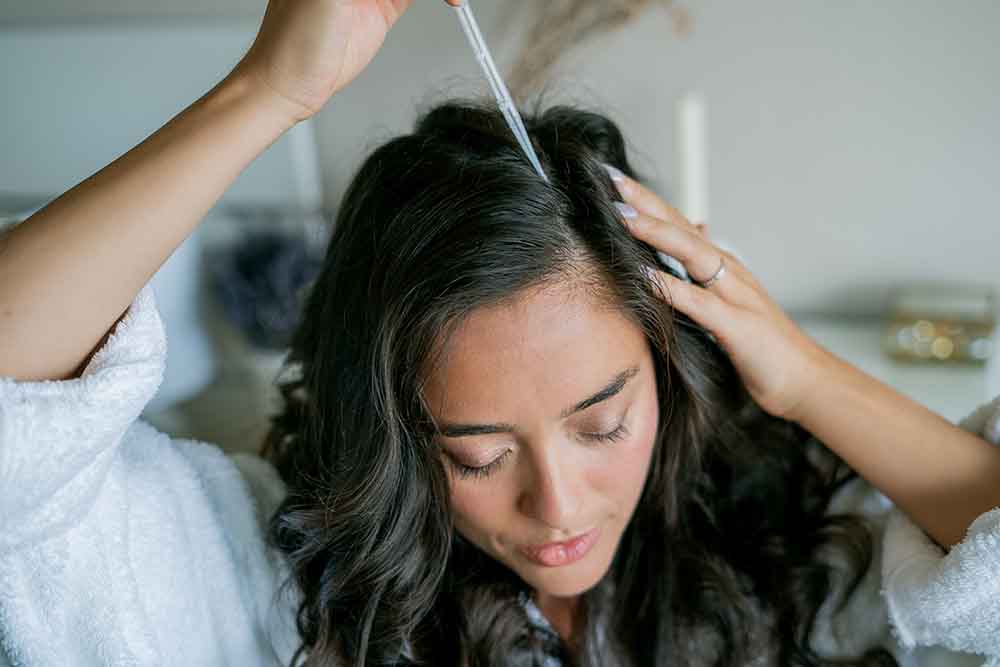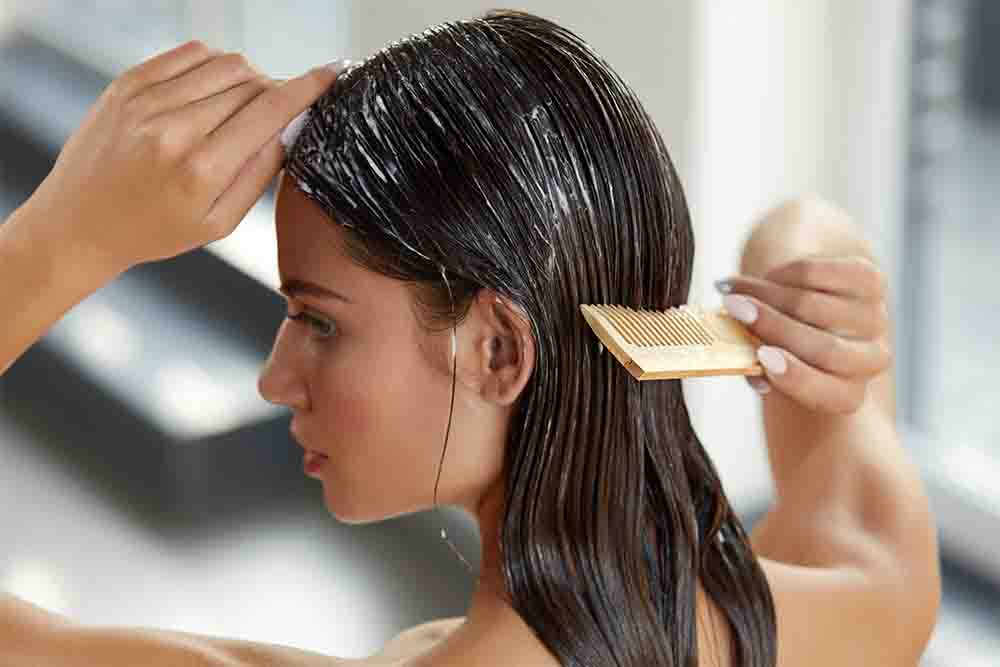Maintaining a consistent haircare routine is essential for achieving and sustaining healthy, lustrous hair. Our hair is constantly exposed to environmental stressors such as pollution, UV rays, and harsh weather, which can lead to damage and dullness. A well-crafted hair care routine helps in nourishing the hair, preventing damage, and enhancing its natural shine. By following a structured regimen, you can address specific hair concerns, promote healthy growth, and keep your locks looking their best. Whether you have curly, straight, or wavy hair, a tailored hair care routine can make all the difference in achieving your desired look.
Your Hair Care Routine: Steps to Healthy Hair
1. Hair Care Routine: Cleanse
Cleansing is the first and fundamental step in any hair care routine. Choose a shampoo that suits your hair type—whether it's oily, dry, or normal. Gently massage the shampoo into your scalp, ensuring it lathers well. This helps in removing dirt, excess oil, and product buildup. Avoid using hot water, as it can strip your hair of its natural oils. Instead, opt for lukewarm water to maintain the moisture balance.
2. Hair Care Routine: Condition
Conditioning is crucial for replenishing moisture and ensuring your hair remains soft and manageable. Apply a conditioner that matches your hair type and needs. Focus on the mid-lengths and ends of your hair, where it is typically drier. Leave the conditioner on for a few minutes before rinsing thoroughly. This step helps in detangling and reducing frizz.
3. Hair Care Routine: Detangle
Detangling prevents breakage and split ends. Use a wide-tooth comb or a detangling brush to gently work through knots, starting from the ends and working your way up. Avoid tugging or pulling, as this can cause damage. For extra ease, detangle your hair while it's still conditioned, either in the shower or with a leave-in conditioner.
4. Hair Care Routine: Nourish
Nourishing your hair involves providing it with essential nutrients and vitamins. This can be achieved through the use of hair masks or leave-in treatments. Choose products with ingredients such as keratin, biotin, and natural oils that help strengthen and repair your hair. Apply these treatments according to the product instructions, usually once a week.
5. Hair Care Routine: Moisturise
Moisturising ensures that your hair remains hydrated and resilient. Use lightweight leave-in conditioners or serums to lock in moisture without weighing your hair down. Focus on the ends of your hair, which tend to be the driest. Regular moisturising helps maintain elasticity and prevents breakage.
6. Hair Care Routine: Treatment
Incorporate treatments like deep conditioning masks or protein treatments into your routine. These are designed to address specific issues such as damage, dryness, or thinning. Use treatments based on your hair's needs and follow the recommended frequency for the best results.

Tips for Healthy Hair
1. Get Regular Trims
Regular trims are essential for maintaining healthy hair. Aim to trim your hair every 6-8 weeks to remove split ends and prevent breakage. This simple step helps in keeping your hair looking fresh and vibrant, and promotes overall growth.
2. Massage Your Scalp
Scalp massages stimulate blood circulation, which can encourage healthy hair growth. Use your fingertips to gently massage your scalp in circular motions for a few minutes daily. This not only promotes relaxation but also helps in distributing natural oils evenly.
3. Avoid Using Heating Tools
Excessive use of heating tools like blow dryers, straighteners, and curling irons can lead to hair damage and dryness. Try to minimise their use and always apply a heat protectant spray before styling. Allow your hair to air-dry whenever possible to reduce heat exposure.
4. Wash Oily Hair More Frequently
If you have oily hair, you might need to wash it more frequently to keep it fresh and clean. Choose a gentle shampoo that targets oil control without stripping your hair of essential moisture. Regular washing helps in maintaining a balanced scalp environment.
5. Oil Regularly
Applying hair oils can provide deep nourishment and enhance hair health. Use natural oils like coconut, argan, or olive oil to moisturise your scalp and hair. Massage the oil into your scalp and leave it on for a few hours or overnight before washing it out.
Choosing the Right Products for Different Hair Types
Selecting the right hair care products is crucial for achieving optimal results. Here’s a guide to help you choose:
● For Dry Hair: Opt for moisturising shampoos and conditioners that contain hydrating ingredients like shea butter or glycerine. Look for deep conditioning masks that provide intense hydration.
● For Oily Hair: Choose clarifying shampoos that help control excess oil without over-drying your scalp. Lightweight conditioners and oil-free styling products work best.
● For Curly Hair: Use sulphate-free shampoos and rich, moisturizing conditioners to enhance curl definition and reduce frizz. Leave-in conditioners and curl creams can help in maintaining bounce and shine.
● For Fine Hair: Go for volumising shampoos and lightweight conditioners that won’t weigh your hair down. Texturising sprays can add body and fullness.
● For Colour-Treated Hair: Use colour-safe shampoos and conditioners that help preserve your hair colour and prevent fading. Look for products with UV protection and nourishing ingredients.
DIY Hair Masks to Try
Creating DIY hair masks at home is an effective and natural way to treat your hair. Here are a few easy recipes:
● Avocado and Honey Mask: Mix one ripe avocado with two tablespoons of honey. Apply to your hair and leave it on for 30 minutes before rinsing. This mask provides deep hydration and nourishment.
● Banana and Olive Oil Mask: Blend one banana with two tablespoons of olive oil. Apply the mixture to your hair and leave it on for 20 minutes. This mask helps in softening and adding shine.
● Yogurt and Egg Mask: Combine half a cup of yogurt with one beaten egg. Apply to your hair and leave it for 30 minutes before rinsing. This mask strengthens and adds protein to your hair.

Common Hair Mistakes to Avoid
Avoiding common hair mistakes can significantly improve the health of your hair. Here are some pitfalls to watch out for:
● Over-Washing: Washing your hair too frequently can strip it of natural oils. Stick to washing 2-3 times a week, or as needed based on your hair type.
● Using Harsh Products: Avoid shampoos and conditioners with sulphates, parabens, or alcohol, as they can be drying and irritating. Opt for gentle, natural products.
● Skipping Heat Protection: Always use heat protectants before styling with heated tools to prevent damage. This helps in shielding your hair from excessive heat.
● Brushing Wet Hair: Wet hair is more prone to breakage. Use a wide-tooth comb to gently detangle your hair when it's damp.
Conclusion
A well-maintained hair care routine is crucial for achieving and sustaining healthy, beautiful hair. By following a structured routine and incorporating expert tips, you can address various hair concerns and enhance your hair's natural beauty. Remember, consistency is key, and choosing the right products tailored to your hair type will make all the difference. With the right care, your hair will be vibrant, shiny, and full of life.
FAQs
How often should I wash my hair?
It depends on your hair type. For oily hair, washing more frequently may be necessary, while dry hair should be washed less often to avoid stripping natural oils.
Can I use the same hair care products every day?
Yes, but it’s important to choose products suitable for your hair type and needs. Occasionally changing products or incorporating different treatments can benefit your hair.
How do I know if my hair is damaged?
Signs of damage include split ends, dryness, brittleness, and excessive breakage. If you notice these issues, consider adjusting your hair care routine or seeking professional advice.
Are DIY hair masks effective?
Yes, DIY hair masks can be very effective, especially when using natural, nourishing ingredients. They offer a great way to address specific hair concerns and improve overall health.
How can I prevent hair loss?
Maintain a balanced diet, avoid excessive heat styling, use gentle hair care products, and handle your hair with care to prevent unnecessary breakage and loss.